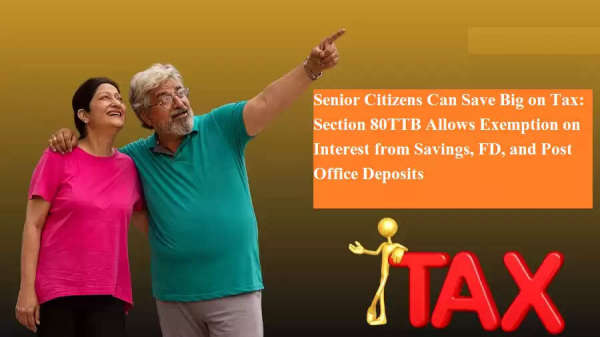
New Delhi, August 31, 2025 – With the income tax filing season for Assessment Year (AY) 2025–26 currently underway, senior citizens have an excellent opportunity to cut down on their tax liabilities. A key provision that works in their favor is Section 80TTB of the Income Tax Act, which allows substantial relief on interest income. By claiming this exemption, many elderly taxpayers can save thousands of rupees every year.
What is Section 80TTB?
Introduced in the Union Budget of 2018, Section 80TTB provides a tax deduction for senior citizens on interest earned from bank deposits, fixed deposits (FDs), and post office savings schemes.
-
Senior citizens can claim deductions of up to ₹50,000 on their total interest income under this section.
-
This benefit covers multiple forms of interest, not just savings accounts, making it broader and more rewarding than Section 80TTA, which applies to younger taxpayers.
Who Can Avail This Benefit?
The exemption under Section 80TTB is available exclusively to:
-
Resident Indian senior citizens aged 60 years or above.
-
It applies only under the old tax regime. Those who have opted for the new tax regime (Section 115BAC) cannot claim this deduction.
Which Types of Income Qualify?
The deduction is applicable on:
-
Savings bank interest
-
Fixed deposit (FD) interest
-
Post office deposit interest
This makes Section 80TTB particularly significant, as it includes almost all types of deposit-linked income sources relied upon by retirees.
Example: How the Deduction Works
Let’s consider a simple example:
-
Interest from savings account: ₹8,000
-
Interest from fixed deposits: ₹1,80,000
-
Pension income: ₹3,00,000
Total income = ₹4,88,000
By claiming the maximum ₹50,000 deduction under Section 80TTB, the taxable income reduces to ₹4,38,000, resulting in significant tax savings.
What Documents Are Needed?
Claiming this deduction is a hassle-free process. No extra documentation is required apart from basic financial proofs like:
-
PAN card
-
Bank statements
-
Interest certificates issued by banks or post offices
This makes Section 80TTB a simple yet highly effective way for seniors to reduce their taxable income.
Difference Between Section 80TTA and 80TTB
-
Section 80TTA applies to individuals below 60 years and Hindu Undivided Families (HUFs). It allows a maximum deduction of ₹10,000, but only on savings account interest.
-
Section 80TTB, on the other hand, applies to senior citizens and allows deductions up to ₹50,000 across savings, FD, and post office deposits.
Clearly, Section 80TTB is far more beneficial for elderly taxpayers.
Section 194A and TDS Relief
Tax Deducted at Source (TDS) on interest income is governed by Section 194A. Currently:
-
For senior citizens, the TDS exemption limit is ₹50,000.
-
For other taxpayers, the limit is ₹40,000.
Notably, the Union Budget 2025 has proposed to raise these limits to ₹1,00,000 for senior citizens and ₹50,000 for others, offering even greater relief once approved.
Why Section 80TTB Matters for Seniors
For many senior citizens, a major portion of income comes from interest earnings and pension. Section 80TTB offers them direct tax relief, helping preserve their income and reduce financial stress. By claiming this deduction, retirees can make their investment income more tax-efficient and ensure higher post-tax returns.
Final Takeaway
Section 80TTB is a powerful tool for senior citizens to save on taxes. With up to ₹50,000 in deductions on interest income from savings accounts, fixed deposits, and post office deposits, retirees can safeguard their earnings while enjoying better financial security.
As the tax filing deadline approaches for AY 2025–26, senior citizens are advised to carefully utilize this provision under the old tax regime to maximize savings. Alongside proposed TDS relief measures, this exemption stands out as one of the most beneficial provisions for India’s elderly taxpayers.
-
'I'm a sleep therapist, these 5 things are making your insomnia worse'

-
DAVV Indore's Semiconductor Chip Unveiled At Semicon India

-
North Korea's Kim Jong Un arrives in Beijing with 'likely successor' daughter

-
Only 5 per cent of people can solve 'impossible' farm animal puzzle

-
Madhya Pradesh: Youth Held For Axing Minor Girl In Jabalpur
